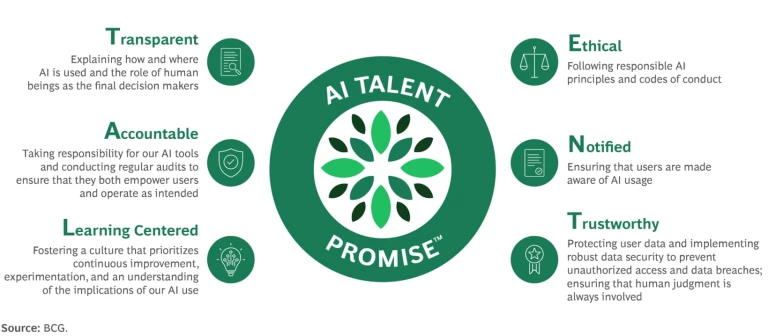The way we work is changing rapidly. Artificial intelligence is reshaping what’s possible, creating big opportunities to make work more engaging, productive, and fulfilling for employees.
People leaders have never had a more important role. They’re guiding companies on how to best integrate AI into daily work and improving the effectiveness of the people function with AI. The companies most successful at generating value from AI devote far more effort on people and processes than on technology (algorithms, infrastructure, and data). In other words, unless the people function is helping prepare employees for AI transformation, companies are leaving value behind.
Farsighted people leaders are seizing the opportunity. Among organizations using GenAI, they are deploying it in the people function 70% of the time. More than 10% of these companies report productivity gains of more than 30%, along with better employee engagement and outcomes.
But there are challenges, too. When we talk with HR leaders, they consistently ask some tough questions: How do we use AI to boost performance and demonstrate value? How do we ensure that AI models are accurately evaluating candidates, and how do we upskill recruiters?
Most fundamentally, they want to know how to address employee concerns about trust, fairness, and potential bias—and how to implement responsible AI principles that enhance the human work experience.
Stay ahead with BCG insights on artificial intelligence
Introducing the AI TALENT Promise
To address these concerns, BCG created the AI TALENT Promise, a commitment to supporting employees and job candidates in key processes such as recruiting, managing performance, staffing teams, and helping people learn. (See the exhibit.)

The TALENT Promise was designed to ensure that our use of AI is:
- Transparent, by explaining how and where AI is used and the role of human beings as the final decision makers.
- Accountable, by taking responsibility for our AI tools and conducting regular audits to ensure that they both empower users and operate as intended.
- Learning centered, by fostering a culture that prioritizes continuous improvement, experimentation, and an understanding of the implications of our AI use.
- Ethical, by following responsible AI principles and codes of conduct.
- Notified, by ensuring that users are made aware of AI usage.
- Trustworthy, by protecting user data and implementing robust data security to prevent unauthorized access and data breaches, and by ensuring that human judgment is always involved.
High-Touch Recruiting
How does a global organization bring the AI TALENT Promise to life? For BCG, it has required new tools, roles, and mindsets.
One such tool is an AI-driven talent intelligence platform, launched in 2023, that has revolutionized our recruiting process. The platform allows for a high-tech, high-touch experience that blends machine intelligence and human engagement. More than three-quarters of our global recruiting teams are using it.
This platform improves the experience of both candidates and recruiters. It provides preliminary matches between candidates and roles based on skills and experience, automates event and interview management, and generates job descriptions for review by recruiters and relevant people managers. Candidates can explore open roles, listen to BCG podcasts, watch videos, take quizzes, and more. They can also use AI chatbots to find relevant information based on their career interests.
The platform has allowed us to increase our communications with candidates by 41%. Overall, candidates have responded favorably to the recruiting process, giving an average satisfaction score of 4.7 on a 1-to-5 scale. One recruit said that it was the “easiest application process I’ve ever had.”
The talent intelligence platform was built on the principles of the AI TALENT Promise. For example, it reinforces the transparency principle by always explaining the interplay between machine output and human decision making.
Introducing such systems and processes can require training and the creation of new roles, including process enablement and data protection managers, as well as solutions architects.
Empowering People Through Constructive Feedback
In performance management, we’ve deployed two tools to assist our team in improving the quality of the ongoing and year-end feedback provided to employees.
A tool called PRIME helps case leaders provide continuing feedback to consulting staff. It transforms case leaders’ notes into structured feedback drafts that they can then edit, significantly expediting review preparation. PRIME enables better-quality feedback while allowing leaders to spend more time coaching and less time writing up forms.
With around 65,000 feedback forms written annually at BCG, PRIME saves about 27,000 hours each year. By compiling performance data throughout a case, it supports leaders in providing balanced, comprehensive feedback to consultants that reduces recency bias and fosters fairness.
Another tool, ChatPDG, is a custom GPT that helps managers of functions such as HR and marketing write year-end reviews for noncase-related work. We chose to design this additional review preparation tool because consultant teams and functional teams operate on different cycles and use different performance criteria. We wanted to ensure that employees trusted the tool, and we also wanted to demonstrate our commitment to the AI TALENT Promise of being a truly learning-centered organization.
With this tool in place, managers have reported saving an average 80 minutes per review. Two-thirds say that the tool has also helped them improve the quality of their reviews overall.
More broadly, the time savings allow managers to have deeper and longer conversations with employees and provide more actionable feedback. Together, these performance management tools are helping to enable a sustained culture of ongoing employee development.
Building Stronger Teams
Our success as consultants depends on our client teams. We are only as strong as the teams we create. As we have grown as an organization and expanded the number of factors we consider when placing a consultant on a case, staffing has becoming increasingly complex.
We are building stronger, more effective, and more balanced teams with AI. For example, we are piloting an AI-powered staffing assistant, Team Builder, that helps staffing teams match consultants to projects based on their skills, carbon footprint (determined by their distance from the client), career development needs, and even measures of intelligence and empathy. Team Builder also allows our staffing experts to adapt team configurations in real time as project needs or consultant availability shifts, improving the experience of our case leaders and clients. As a result, it has cut the time it takes to place a consultant on a case by more than half.
Personalizing Growth in Learning and Development
BCG is a learning organization. We pride ourselves on continuous skill development. GenAI is improving skills and capabilities throughout the firm, not just in the people function. For example, GenAI delivers personalized, adaptive learning experiences to all staff. We have also developed AI chatbots that answer queries and navigate users to the learning options that best suit their needs.
Consultants use GenAI to create simulated environments that allow them to work on soft skills, such as providing feedback to team members or pitching a new topic to clients; they receive immediate and highly personalized feedback on their delivery and impact. These dynamic experiences encourage personal growth and skill development.
Looking Ahead
As our people function continues to pioneer AI initiatives, we’re committed to sharing insights, adapting best practices, and refining our approach based on feedback from our teams and recruits. We’re proud of the transformative potential of AI at BCG, not as a replacement for human judgment but as a powerful complement.
Our goal in sharing the AI TALENT Promise and BCG’s own journey is to encourage the broader people and HR community to engage on these issues. Organizations are welcome to adopt and adapt the promise as their own. We would be thrilled if it emerges as a standard for the industry. (See "Bringing the AI TALENT Promise to Life.")
We also hope that the AI TALENT Promise highlights the critical role of people in AI transformations. Chief people officers need to be at the table with CEOs and CIOs as this exciting but uncertain future unfolds.With a clear commitment like the TALENT Promise, people leaders can start to build a roadmap for an AI-enabled future at work.
Bringing the AI TALENT Promise to Life
1. Codify your organization’s AI TALENT Promise. Define and communicate clear responsible AI principles that govern how AI will be used in HR and beyond. Make this visible to employees and job candidates.
2. Articulate the impact of AI on your employees and hiring plans. Review critical talent in your organization and the broad impact of AI on that talent today and in the future. Use this review in designing your operating model, hiring plans, and change management efforts.
3. Invest in upskilling the people function. Equip HR teams with the skills and roles needed to lead AI initiatives and help shepherd the workforce through this transition.
4. Embed AI in high-impact people use cases. Start with high-leverage areas like recruiting, feedback, staffing, and learning. Pilot AI tools that improve the employee experience and outcomes, ensuring that human decision makers remain in the loop.
5. Create feedback loops with employees and candidates. Use surveys, AI dashboards, and ongoing dialogue to track trust, transparency, and satisfaction with AI tools.
6. Partner across functions to scale responsibly. Work closely with technology, legal, and data teams to vet tools and and ensure that you are following responsible AI principles as you scale.
The authors thank Alex Borovsky, Michael Brent, Sally Cratchley, Robin Dagostino, Ashley Egan, Chris Gentile, Natalie Glick, Meital Haas, Anne Kinnane, Katherine Rivet, Naomi Oppenheim, and Josh Singer for their help in the preparation of this article.






